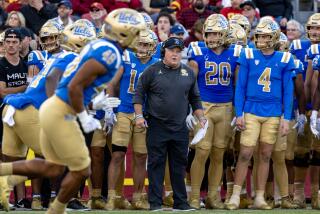The General’s Stepping Into a New Star-Studded World : Thomas W. Kelly led the Pentagon’s daily briefings during the war. Now, soon to retire, he’ll likely be the hottest thing on the lecture circuit.
- Share via
WASHINGTON — There he was, standing at attention, three stars on each shoulder board gleaming under the television lights of the Johnny Carson show as Doc Severinsen struck up the band. “And now,” you could almost hear Ed McMahon boom, “ heeeeerrrreeee’s the general.”
For 42 days of the Persian Gulf War, as he mixed it up with the press corps at the Pentagon’s daily televised news briefings, Lt. Gen. Thomas W. Kelly was the armed forces for many Americans--and a reassuringly human and appealing Pentagon he was, too.
The 58-year-old Kelly, an engaging bear-like figure who managed to be both funny and inspirational, seemed all the more likable for his occasional bungled phrase and his penchant for words not found in any dictionary--such as his favorite verb, attrit.
A GLEAMING FUTURE: Now, retiring after 34 years of successful but relatively obscure service in the Army, Kelly has a new message for his fellow Americans. It is a message that probably will be as well received as his briefings and, coincidentally, turn a modest soldier into something close to a wealthy man.
Of all the instant military celebrities created by the Gulf crisis, Kelly will be the first to test the waters of the private sector. And his prospects look as bright as the stars on his uniform. Overnight, he promises to become the hottest thing on the U.S. lecture circuit.
Although he cannot make any commitments until his official retirement at the end of this month, he has tentatively accepted more than 50 speaking engagements in the next two months--for fees that a knowledgeable source said run $20,000 per appearance, plus expenses. Added up, it comes to more than $1 million--quite a supplement to his $67,400 annual Army pension.
What’s more, the requests keep coming. Universities, textile manufacturers, pharmaceutical companies, beauticians--they all want to hear the general’s folksy mix of patriotism and humor. And, on Wednesday, the Enron Corp., a Houston oil and gas firm, announced that it planned to nominate Kelly to its board of directors. The general’s agent, Don Walker of the Harry Walker Agency in New York, says: “Literally, we’ve gotten hundreds and hundreds of offers. We’ve been in business 46 years. I’ve never seen anything like this. It’s incredible.”
Kelly’s message is straightforward: After the triumph of the war, it’s time for Americans “to take off the hair shirt”--especially about their younger generation.
AMERICAN YOUTH: Of all the groups in this country, he says, young people “probably get maligned the worst”--blamed for costing the United States its competitive edge economically and militarily. Yet those same young Americans won the Persian Gulf War by demonstrating their skills with some of the most technologically advanced equipment ever devised, Kelly declares.
“They took a bum rap. I think America can be justly proud of its youth and justly proud of itself,” he said in his last round of interviews as a military man.
As a Vietnam veteran, Kelly said, he is keenly aware of the difference between fighting a war with and without the full support of the American people.
This is just the sort of triumphant theme that Kelly sounded so skillfully during the daily Pentagon briefings--often throwing in a quip or two on the side. On being asked over and over how many Iraqis had been killed, he finally deadpanned: “The number that I can come up with . . . is one Iraqi army.”
He often made Iraqi President Saddam Hussein his foil. When reports circulated that Hussein had executed two of his top generals, Kelly said it sounded plausible, given the Iraqi leader’s record: “He does have a dynamic zero-defects program.”
Kelly took a few gentle shots at the press also. After one particularly convoluted question, he paused, then said: “I would like to diagram that sentence some day.”
A GRACIOUS DEPARTURE: In his final appearance before the reporters, Kelly was ready with grace notes. “At no time were you ever impolite to me, and at no time did I ever become offended,” he said. “And, as you know, I hold a lot of you in great respect.”
For those who criticized the media coverage of the war, he added: “Having a free press has served the United States well for 215 years. It is a crucial element in our democracy, and, if anybody needs a contrast, all they have to do is look at the country that didn’t have a free press and see what happened there.”
If Kelly had chosen the family business, he might have been asking the questions at the Pentagon briefings rather than answering them. His father, mother, grandfather and uncle all worked for the Philadelphia Inquirer, and Kelly majored in journalism at Trinity University.
That was not to be. As he told Carson in his appearance on the “Tonight Show” last week: “All little boys want to be soldiers, and most of them grow out of it, but I didn’t.”
After three decades-plus of “Be All You Can Be,” Kelly is looking at opportunity in a new light. When Carson asked him about his longer-term goals, Kelly slid a look at Carson sidekick McMahon and said slyly: “That’s interesting. I’d sort of like to talk to you when Ed’s not around.”
More to Read
Sign up for Essential California
The most important California stories and recommendations in your inbox every morning.
You may occasionally receive promotional content from the Los Angeles Times.













